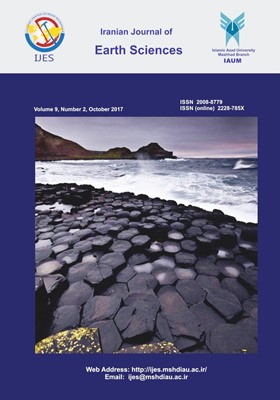Palaeostress configuration of Pan-African orogeny: evidence from the Igarra schist belt, SW Nigeria
محورهای موضوعی : Mineralogy
1 - Department of Geology, University of Calabar, Nigeria
کلید واژه: Conjugate shear fracture, Pan &ndash, African, Compressive stress, Igarra schist belt,
چکیده مقاله :
The stress configuration and tectonic analysis of the Pan – African orogeny is drawn from the Igarra schist belt, southwestern Nigeria. The analysis of conjugate shear fractures of the schist belt indicates that two distinct compressive events (NE – SW and E – W) occurred in this Pan – African mobile zone. The palaeostress systems reveal a clockwise rotation of compressional axis from D1 (NE – SW) to D2 (E – W) during the propagation of the schist belt. The dominance of E – W compression related structures and the identification of E – W compressive stress in other Pan – African regions suggest that only the E – W compression probably had a strong regional effect during the Pan – African orogeny, other episodes of deformation most likely had a partially regional or local effect. The occurrence of structures related to the E – W compression in the younger rocks (granite and syenite) and the absence of structures related to the NE – SW compression in these rocks indicates that the E – W σ1 is a younger episode of deformation (D2) than the NE – SW σ1 deformation (D1) and probably lasted for a longer period. The dihedral angles (2ϴ) of the conjugate shear fractures range from 350 to excess of 800 and this situation shows that the orogeny produced a combination of both brittle and ductile deformation.
The stress configuration and tectonic analysis of the Pan – African orogeny is drawn from the Igarra schist belt, southwestern Nigeria. The analysis of conjugate shear fractures of the schist belt indicates that two distinct compressive events (NE – SW and E – W) occurred in this Pan – African mobile zone. The palaeostress systems reveal a clockwise rotation of compressional axis from D1 (NE – SW) to D2 (E – W) during the propagation of the schist belt. The dominance of E – W compression related structures and the identification of E – W compressive stress in other Pan – African regions suggest that only the E – W compression probably had a strong regional effect during the Pan – African orogeny, other episodes of deformation most likely had a partially regional or local effect. The occurrence of structures related to the E – W compression in the younger rocks (granite and syenite) and the absence of structures related to the NE – SW compression in these rocks indicates that the E – W σ1 is a younger episode of deformation (D2) than the NE – SW σ1 deformation (D1) and probably lasted for a longer period. The dihedral angles (2ϴ) of the conjugate shear fractures range from 350 to excess of 800 and this situation shows that the orogeny produced a combination of both brittle and ductile deformation.


